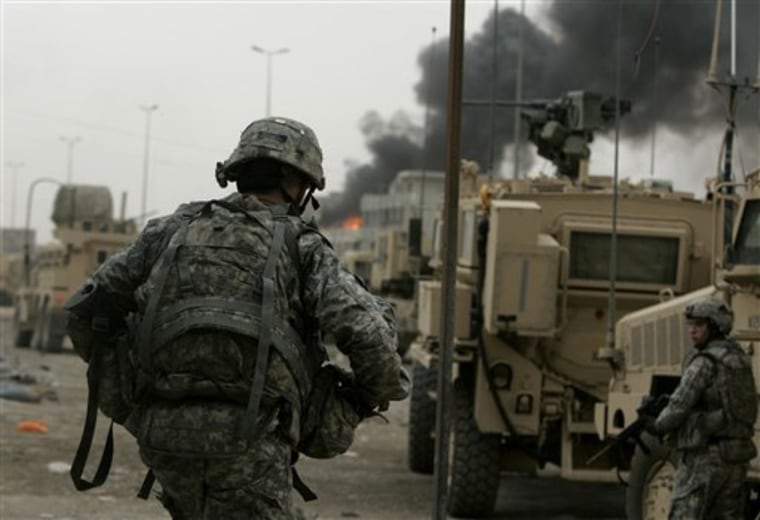Did the House of Representatives vote to end funding for the Iraq war?
It certainly looked that way — but let's delve deeper into what really happened Thursday between the Democrats and Republicans on Capitol Hill.
First, the Democratic leadership put a bill on the floor, separated into three parts, which would have provided funding for Iraq and Afghanistan operations, as well as new benefits for military veterans and an extension of unemployment benefits for people who had lost their jobs.
The three-part design would have allowed anti-war House Democrats to vote “no” on the Iraq and Afghanistan funding, but “yes” on the other parts of the measure.
This was done in the belief that GOP members of the House wouldn't allow the measure to fail. The Democrats assumed they could voice their opposition to war, but without any real legislative repercussions
But 132 Republicans refused to play their part in what they saw as a charade.
They voted “present” rather than supply the votes necessary to pass the Democratic-designed measure.
Until Thursday, Speaker Nancy Pelosi had, for 18 months, successfully managed the divisions in her party over funding the war.
In this effort, her most valuable allies had been the House Republicans.
Along with a few dozen Southern and some Midwestern Democrats, Republicans had reliably supplied the votes to pass previous Iraq and Afghanistan funding bills — legislation that Democrats often voted down in a show of anti-war solidarity.
That ended Thursday afternoon, at least temporarily.
'Use us before they abused us'
“They wanted to use us before they abused us,” said House Minority Leader John Boehner told reporters after the dramatic vote on the House floor. What the Republicans had done with their protest vote of “present” was to “expose a cynical ploy,” he contended.
Republican leaders said the Democrat-designed bill was a farce since they knew Bush would veto it anyway since it included billions in unrelated domestic spending.
“This peeled back the cover on a very phony process,” said Rep. Bill Young, R- Fla., a veteran GOP leader on military spending, who voted "present."
Boehner said there were more than enough Republican and Democratic votes to pass war funding with no added domestic funding attached, if only Democratic leaders would allow such a measure to come to a vote.
'A cutesy-pie gimmick'
By voting ‘present,’ the Republicans “voted for a cutesy-pie gimmick to try to screw up the entire process. What they did is bite themselves in the tail coming back,” fumed Appropriations Committee chairman Rep. David Obey, D- Wisc.
“What they did just demonstrates what happens when panic sets in after a Mississippi House seat loss,” added Obey, referring to the GOP defeat Tuesday in what had been a Republican-held House seat in Mississippi.
“We gave them an opportunity to vote up or down on the merits on supplemental funding for the war and 132 of them ducked the vote in order to be cute.”
While House Democratic leaders were furious at the turn of events, anti-war Democrats seemed thrilled at their momentary victory.
Did the House vote to de-fund the war? “I hope to God that is the case,” said Rep. David Wu, D- Ore., who voted ‘no’ on the funding.
Wu gleefully slapped Rep. Thaddeus McCotter, R- Mich., a leader of the GOP protest effort, on the arm as he walked on to the House floor after the vote.
“These guys on the Democratic side are congratulating me on losing the vote — they’re saying, ‘Gee, we finally stopped the funding on the war,’” said Rep. John Murtha, D- Pa., who voted for the war funding.
Asked who, if anyone, was to blame for not ensuring that enough House members would vote ‘yes’ to pass the funding measure, Obey said heatedly, “It is no one’s responsibility to round up votes! This isn’t a cattle call; we specifically told our members to ‘vote your conscience.’ That’s what they came here to do and that’s what they did today, on our side. I doubt that there are 132 Republicans who can say they voted their conscience.”
Noting that 147 Democrats voted against the funding while only 85 voted for it, Murtha added, “I might have lost, but the Democrats won.”
Murtha also argued that Republicans would have a hard time explaining their votes to the electorate.
“It’ll be very hard for this president to criticize the Democrats when the Republicans voted against this, I mean when they voted present, and they complain they need the bill by June 15,” Murtha said. “Now it may be a problem having it by June 15.”
“It’s irresponsible,” he added. “There’s no money for the troops right now. That’s their problem.”
Will any soldier or Marine suffer for lack of equipment or ammunition due to the vote Thursday?
“No, absolutely not,” said Young, “This is a process, an ongoing process.”
The House will eventually vote on a Senate-passed funding bill and perhaps go through the same stand-off again.
Eventually once the wrangling ends and after a veto, “There’s no question the money will be available,” said Young.
The House Thursday did pass a Democratic plan to sharply boost education benefits for Iraq-Afghanistan veterans and to award people whose unemployment benefits have expired with a 13-week extension.
The 266-166 fell short of the two-thirds needed to overcome a promised veto by President Bush.
The plan would impose a surtax on individual incomes exceeding $500,000 to pay for the 10-year, $52 billion cost of boosting the GI Bill to provide Iraq veterans with college educations. Couples would pay the tax on income exceeding $1 million.
The Associated Press contributed to this story.
